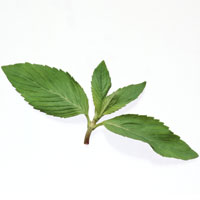health guides
Mint

Preparation, Uses, & Tips
Especially popular in Greek and Lebanese cuisines, mint is used in both sweet and savoury dishes and in drinks such as the famous mint julep.
The menthol that gives mint its aroma and taste is too intense to use in subtly flavoured savoury dishes, but it makes mint a lively addition to teas and chocolate, as well as chilled rice, tabbouleh, and couscous salads. Mint jelly or sauce is a traditional accompaniment to lamb. Feel free to add a few sprigs of fresh mint to simmering bean soups, chickpeas, or spinach-rice pilaf. Fresh or dried, it is also excellent with cucumbers, tomatoes, aubergine, and string beans.
Mint is often used in combination with mashed garlic and salt to flavour yoghurt-based salads and sauces; the proportions are usually 1 tablespoon (1.2g) dried or 3 tablespoons (8g) finely chopped fresh mint to 2 portions (473.2ml) of yoghurt.
This herb is also one of nature’s most effective breath fresheners. Although gentle, mint’s flavour is very noticeable. If you are not very fond of it, you may want to either omit it or decrease by half the amount called for in any recipe.
Copyright © 2024 TraceGains, Inc. All rights reserved.
Learn more about TraceGains, the company.
The information presented in the Food Guide is for informational purposes only and was created by a team of US–registered dietitians and food experts. Consult your doctor, practitioner, and/or pharmacist for any health problem and before using any supplements, making dietary changes, or before making any changes in prescribed medications. Information expires December 2024.


 We are proud to announce that
We are proud to announce that  As the market evolves, customers increasingly request a wider variety of omega-3 options for their lipid...
As the market evolves, customers increasingly request a wider variety of omega-3 options for their lipid...  Maintaining healthy glucose levels is crucial for preventing metabolic conditions like diabetes,...
Maintaining healthy glucose levels is crucial for preventing metabolic conditions like diabetes,...  Looking at formulating a new vitamin blend? Discover
Looking at formulating a new vitamin blend? Discover 







































